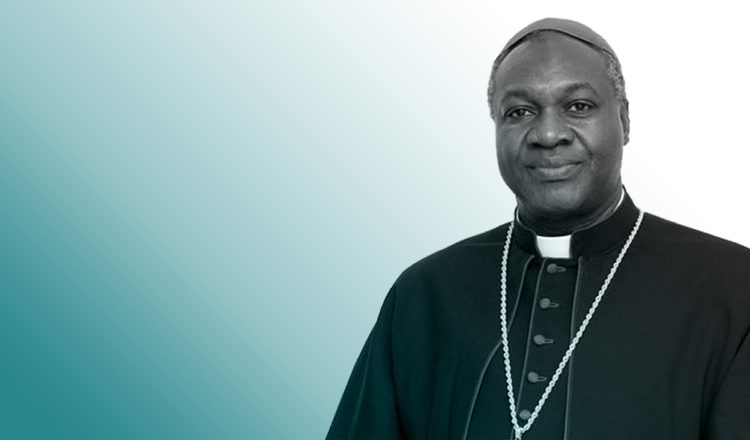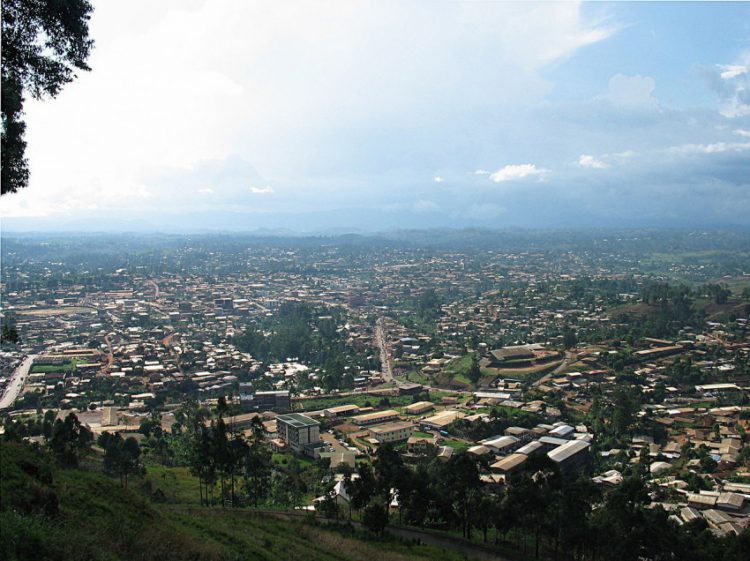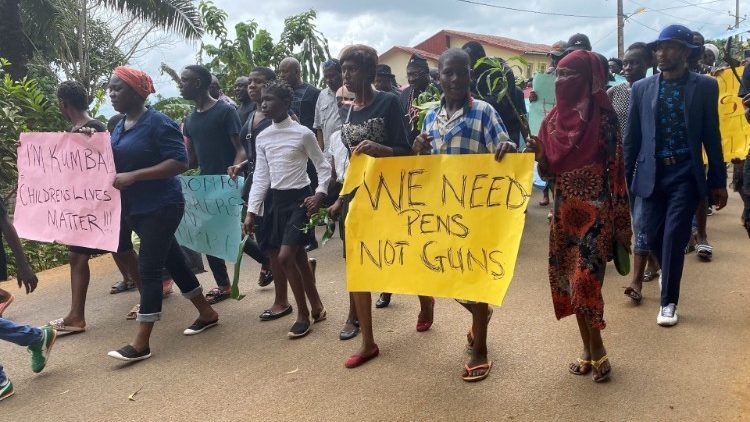
Violence, faith, serenity, smile

Children were slaughtered on October 24 in the city of Kumba, Cameroon when armed men attacked the Mother Francisca International Bilingual Academy. Several students were injured, and at least 6, between age 9 and 12 were killed in gunshots or wounded to death with machetes. Such, and similar kidnappings or actions to kill young people are quite systematic in this African country. Here, in this conflict-troubled country serves Joseph- Marie Ndi-Okalla, the Bishop of Mbalmayo, a guest speaker of the International Eucharistic Congress.
Misery in the land of diamonds and gold mines
A country of 25 million inhabitants, Cameroon, alike to many other African countries is extremely unstable in terms of its political status. Its northern region is threatened by frequent kidnappings and terrorist attacks, while the western territories are posed to separatist movements’ assaults. Two out of the country’s regions are English-speaking, while the rest belong to the French-speaking ones. Located in the Gulf of Guinea, Cameroon is highly characterized by its ethnic, linguistic and religious diversity, 60 % of its population is Christian, out of which Roman Catholics represent the major part.

Though Cameroon is exceptionally rich both in natural and mineral resources –mainly through its gold and diamond reserves-, more than 40 % of the population still live in deep poverty. In 2017 the value of the national gold production amounted up to USD 42 million just in the eastern part of the country, though, in wake of the high rate of corruption its benefit did not manifest in the national economy. Last year a further 300 new mining territories were allocated for gold, uranium, diamond and zinc exploitation, in which mostly Chinese and American investors showed interest.
Employing local labour, and on account of the frequent inhumane work conditions, many fatalities occur. As soon as a mining territory becomes depleted, the international companies move away, leaving behind huge ecological devastation. The Catholic Church, constituting the backbone of the country’s health care system, has a key role in social care, in the fight against AIDS, but above all in the field of education.
Major Powers’ border shifting
During the 19 th century this part of Africa fell under the colonial control of Germany, and locals were used as forced labour. Following World War I the territory was split into two and partitioned between the United Kingdom and France. The French had kept the colonial system of forced labour while the British had liquidated it, however administered their territory from the neighbouring Nigeria letting into British-Cameroon the Nigerian migrant workers, which triggered serious conflicts with the local natives. After World War II Cameroon wanted to achieve independence, but both the French and the British did everything to balk such plans. Nevertheless, in 1960 French Cameroon gained independence, and a year later it was united with British Cameroon, thus forming the Federal Republic of Cameroon. The country has been characterized ever since by ethnical fragmentation, by political corruption at all levels around the significant economic resources –oil, precious metal- and on top by the efforts for a centralized power.

Christmas bloodshed
The Anglophone – Francophone conflict quite often leads to street riots and violence, particularly in the Northwest and Southwest regions. Given the Anglophone territories’ efforts for a split, a protracted conflict developed between the army and the separatist forces. Ambazonia has already declared independence, it has its own currency, anthem and media. The government forces, along with the military, are trying to break down the autonomy attempts.
Besides the enormous corruption in Cameroon, it’s also a fact that President Paul Biya, ruling the country since 1982, is moving to set up a centralized power, primarily by relying on the army. In December 2019 five thousands Cameroonian citizens fled their homes in the wake of military operations in the far Northwest regions. On Christmas 2019, the Southwest area faced clashes between the armed groups and the military. At the same time the Boko-Haram terrorist organization has activated itself around the northern territories.
The “Virus”
Amid such circumstances and conditions is doing his service Joseph-Marie Ndi-Okalla, Bishop of Mbalmayo. The ever smiling Church Dignitary grew up in a deeply faithful Catholic family of 11 children. The guest speaker of the International Eucharistic Congress of Budapest has a degree in theology, in social sciences, and was ordained bishop in 2017. He is also the author of numerous articles and scientific publications. In his declarations the Bishop of Mbalmayo does not fail to draw attention to the “virus”, namely to the rising religious fundamentalism in Africa. Interreligious dialogue and social peace are matters of heart for Joseph-Marie Ndi-Okalla, so he is working hard to carry out effective communication between the Cameroonian government and the rebels.
In the service of dialogue and reconciliation
Both Joseph-Marie Ndi-Okalla and the Church are striving to accomplish their mission for salvation, reconciliation, and evangelization. The Catholic community of Africa is constantly expanding, as from the beginning of the 20 th century the Catholic believers’ number in the continent has increased from 2 million up to 200 million. Cameroonians’ faith life is very much featured by songs and dances that take an important role in the ceremonies, thus the liturgical events are basically characterised by joy and serenity.
The Synod of Bishops for Africa held in 2009 marked a milestone for the Catholic faith on the African continent. Praising the values of Africa, Pope Benedict XVI had the view that the huge African continent constituted an “immense spiritual lung” in a world that appeared to be in crisis of faith and hope.
Sources: cameroon.tribune, youtube.com, fr.missioner.com
Photo: IEC, Magyar Kurír










